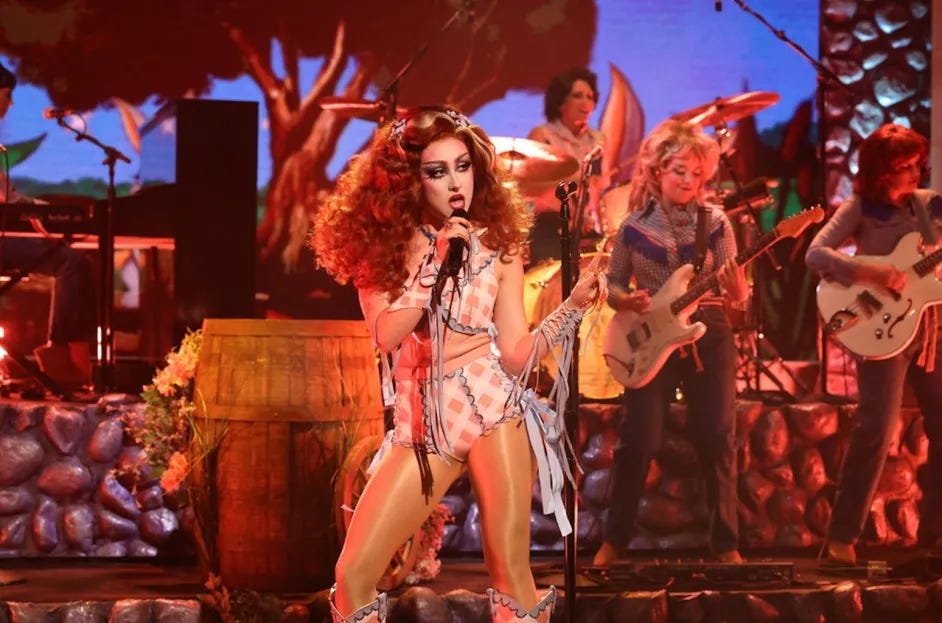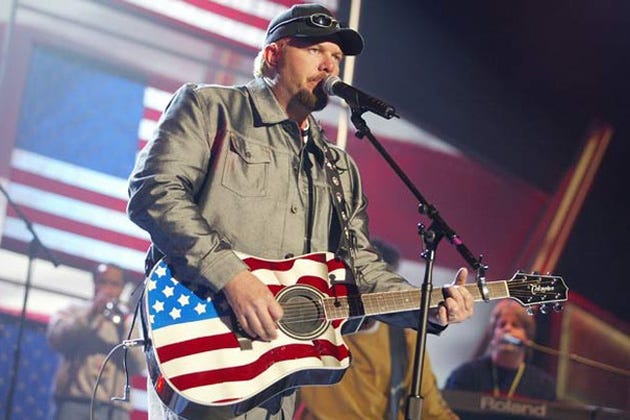In the afterglow of her debut album’s mammoth success, Best New Artist Grammy win, and several highly-publicized “diva” moments, it’d be an understatement to say that the public has been waiting with bated breath for Chappell Roan’s next move. Concerned that the media criticism and overly parasocial fans would get to her, I for one was worried that the breakout pop star of 2024 would retreat from the public eye - I certainly wouldn’t blame her.
Instead, she’s doing the opposite, embracing the newfound attention tenfold. Since the start of the new year, Roan has announced a handful of European festival performances, made several Paris Fashion Week appearances, and released a new song. “The Giver” hit streaming platforms on March 13 but was teased back in November when Roan performed as a musical guest on Saturday Night Live. Her last single, 2024’s “Good Luck Babe!”, peaked at No. 4 on the Billboard Hot 100 and instantly became an iconic addition to her discography, with its 80s-esque synth, Kate Bush-like vocals, and melodramatic hook about love and loss.
“The Giver” has also reached No. 4, though it’s a slight departure from Roan’s usual sound: it’s a country song. Outfitted with a fiddle, a banjo, and twang, “The Giver” follows the lyrical tradition of typical American country songs, but with a queer twist. Embedding the song with cheeky innuendos, Roan sings about working hard to satisfy her partner with a chorus that reads: “'Cause you ain't got to tell me / It's just in my nature / So take it like a taker / 'Cause, baby, I'm a giver.” At her SNL performance, during the song’s bridge, Roan looked squarely in the camera and said, in her usual confrontational nature: “All you country boys saying you know how to treat a woman right. Well, only a woman knows how to treat a woman right” before belting out the hook “She gets the job done.”
Expectedly, “The Giver” has caused fans and media outlets to heavily debate what Roan’s next album will be like - will it be a country album? Is Chappell now a “country artist”? Also expectedly, Roan has been quick to squash any attempts to put her into a box. In her Instagram caption announcing the song, Roan writes: “Many people have asked if this means I’m making a country album??? My answer is.. hmm right now I’m just making songs that make me feel happy and fun…may the classic country divas lead their genre, I am just here to twirl and do a little gay yodel for yall.”
On Cowboy Carter (2024), Beyoncé was similarly quick to halt critics from lassoing a genre around her work (in her song “SPAGHETTII” she sings, “Cunty, country, petty, petty, petty / All the same to me, Plain Jane, spaghetti). Roan famously hails from Missouri and Beyoncé is a proud Houston native - regions of the country known for folk and country music. Their respective forays into the genre can be seen as symbolic returns home - a form of grounding amid their cataclysmic rises to pop stardom. “I can’t call myself the Midwest Princess and not acknowledge country music, straight up,” Roan said in an interview with Amazon Music. “That’s what’s around me at grocery stores. That’s what playing on the bus.”
Chappell Roan and Beyoncé aren’t the only pop stars recently experimenting with a country sound. There are traces of country across Sabrina Carpenter’s pop album Short n’ Sweet - particularly on songs like “Slim Pickens.” Carpenter also recently released a countrified remix of her single “Please Please Please” with Dolly Parton, in which she leans into the twang that comes so naturally to her soprano register. Lana Del Rey’s last three studio albums have taken place against a Midwestern and Southern backdrop, singing about desertion and loss in Oklahoma and Paris, Texas. Lana released a cover of John Denver’s “Take Me Home, Country Roads” in 2023 and continued teasing a country album titled Lasso throughout 2024 (which feels more mythical than material at this point).
In 2017, Kesha took a country turn with Rainbow, an album that reckoned with the abuse she faced from former producer Dr. Luke. And Lady Gaga famously released Joanne, a country-pop album, in 2016, which served as an effective precursor to her Oscar-nominated role as Ally, a country-turned-pop star, in 2018’s A Star is Born.
Carpenter, Lana, Kesha, and Gaga all lack explicitly Midwestern or Southern roots, which may make their tip-toeing into country and country-pop puzzling. However, similar to a pop artist’s “unplugged” acoustic set, a pop star going country often makes them appear more down-to-earth, thoughtful, and subsequently more tied to the music they’re releasing. It makes sense why Gaga wove a country sound into an album dedicated to her late aunt Joanne Germanotta, and thus an album most closely linked to her personal life. Kesha deliberately chose to lean more Western on an album about finding strength and happiness after suffering, illustrating herself not unlike a lone cowboy bravely venturing into the unknown.
On the other hand, the pop genre has a reputation for being superficial, materialistic, and subsequently, more feminine, which has historically made critics less kind to it. The stereotype goes that pop stars sing about boys and fashion and partying, while country stars sing about home, family, grief, and being one with the natural world, often with a piece of straw between their lips. Pop is manufactured and country flows with the integrity of a clear stream. As such, pop girls turning to country offers fans the perception that they’re gaining more direct access to the artist’s psyche. “This is the real me,” a pop star seems to say, as she wipes off the glitter and trades her backup dancers and wigs for the costume of a spotlight, stool, and guitar. The humble - and even glitzy - country act is an effective foil to a pop star’s grandiose persona, making her inevitable swing back to pop all the more exciting (see Lady Gaga’s Chromatica (2020) and subsequent stadium tour).
With the ubiquity of pop music and the localized nature of country music, going country also allows pop artists the chance to subvert or satirize typical country themes - like Roan is doing (or attempting to do, according to this great analysis from GAY POP) on “The Giver.” In twenty-first-century America, country music is a highly politicized genre. I can’t count the number of conversations I’ve had with music lovers who will listen to just about every genre of music “except country.” They are sure to emphasize “except country” with a knowing look, implying that they also don’t vote for Trump. In 2023, country artist Morgan Wallen - whose music I’ve never heard - spent a record-breaking sixteen weeks on the Billboard Hot 100, causing many pop fans on Twitter to joke that we indeed live in two Americas.
Country music’s Republican associations took a heavier hold following the 9/11 attacks, after which songs like “Courtesy of the Red, White, and Blue” and “Have You Forgotten?” dominated the country airwaves. In the twentieth century, country music themes often championed working-class people. Johnny Cash conveyed himself as anti-establishment (or at the very least, anti-prison) and Dolly Parton’s “9 to 5” became an unofficial anthem of second-wave feminism. In the 2000s and 2010s, country music was still for the people but was imbued with far more patriotism and references to God, freedom, war, and safeguarding one’s assets. June Carter plucking her autoharp on a stool shifted to a sleeveless Toby Keith singing about fighting for his freedom, surrounded by American flags on jumbotrons.
Naturally, the pop girls going country are coloring their music with their public-facing values, which are often more outright “progressive” than those of the typical twenty-first-century American country star. “Whole lotta red in that white and blue, huh / History can’t be erased / Are you lookin’ for a new America? / Are you tired, working time and half for half the pay?” Beyoncé sings on “YA YA” against a psychedelic, rock and roll beat, blending the genre’s legacy of advocacy with the pop rhetoric of partying. Granted, the current conservative state of country music gives pop artists a greater distance to swing the pendulum - the set-up for subversion is right there, they’ve just got to take the bait.
Roan shares that she wrote “The Giver,” in part, because a “lesbian country is really funny.” Beyond the inherent humor in it, Roan, Beyoncé, and the other pop girls going country are partaking in a great American tradition, while also making it their own. In the process, and perhaps without even doing so deliberately, they’re also extending a kind of interwoven olive branch. A kind of wave toward the musical themes and values that pop and country fans share. A nod at the intersection in our Venn Diagram, indirectly referencing our universal reverence for love and loss and desire for a more fulfilling life in a beautiful and, at times, cruel world.
I fear that more pop stars may go country haphazardly, in an attempt to stay dynamic and “subversive” in an industry that increasingly values versatility and “eras” over the integrity of those eras. I shudder at the idea of a Tate McRae country album, for instance. The country trick will lose its subversive edge as more girls adopt it. Until then, the pop-to-country-back-to-pop shifts have perhaps been effective in silently sowing some symbolic, sonic unity at a time when political division feels more stark and consequential than ever.
At the least, they’ve added cowboy hats to the common concertgoers’ repertoire, which we’ll need as more pop girls go country. It won’t be our last rodeo.









Pop is by nature a music genre that simply conforms to what sound is "in". Pop has absorbed and will continue to absorb portions of rock, rap, edm, and country, as well as any new genre of music.
Subversion or edginess is always at the heart of the first wave of songs that incorporate a certain sound. The phenomenon is not inherently political but often takes advantage of political tensions to generate a subersive or edgy feeling, e.g. oooh I'm singing along to the taboo or appropriated sounds of minorities/republicans/tech bros (rap, country, and edm respectively) or whatever the niche genre might represent.
This edginess is followed by a herd of trend chasing songs, and then finally the trend dies off, leaving only small elements of the original sound in the music, now routinely incorporated by diligent producers.
Rinse and repeat!